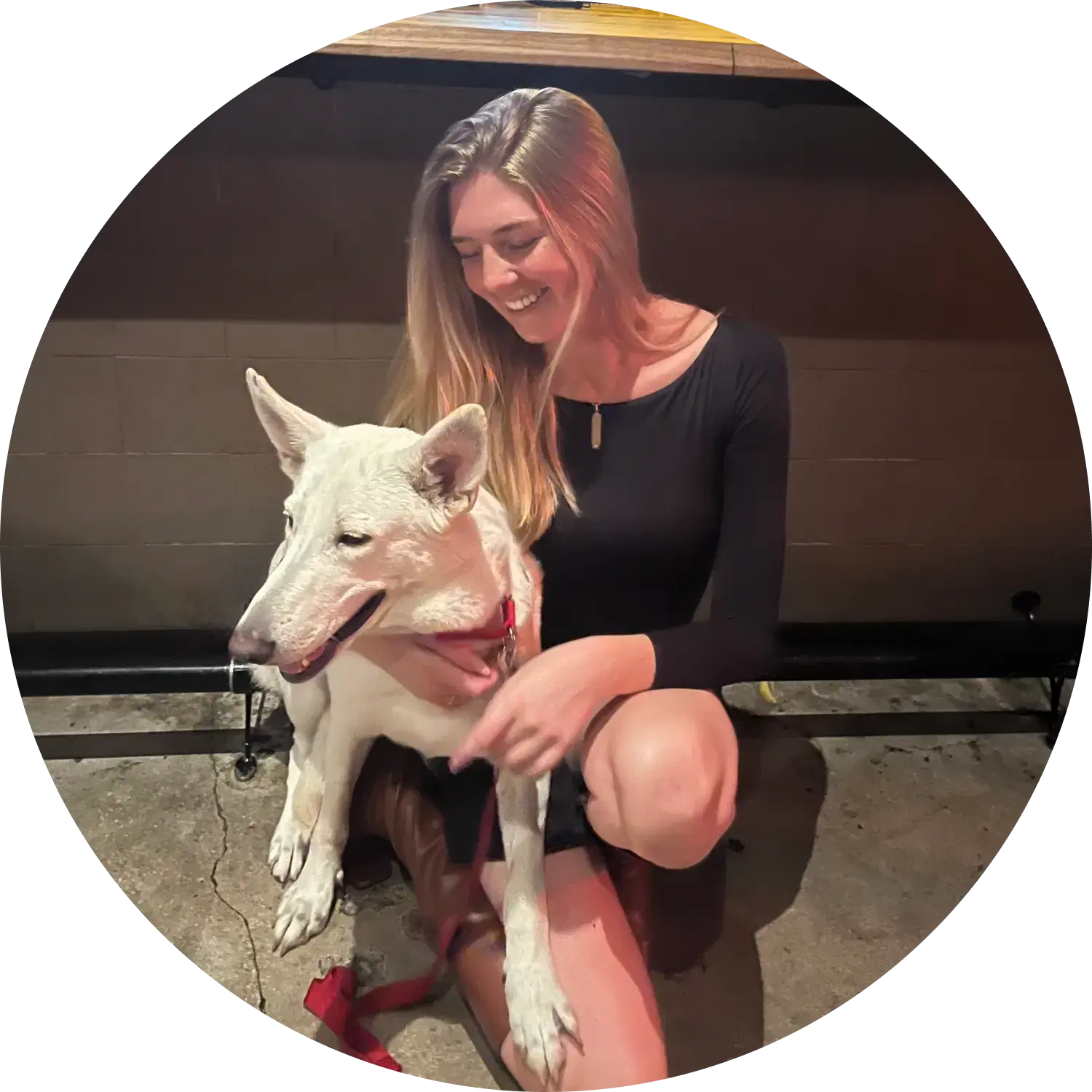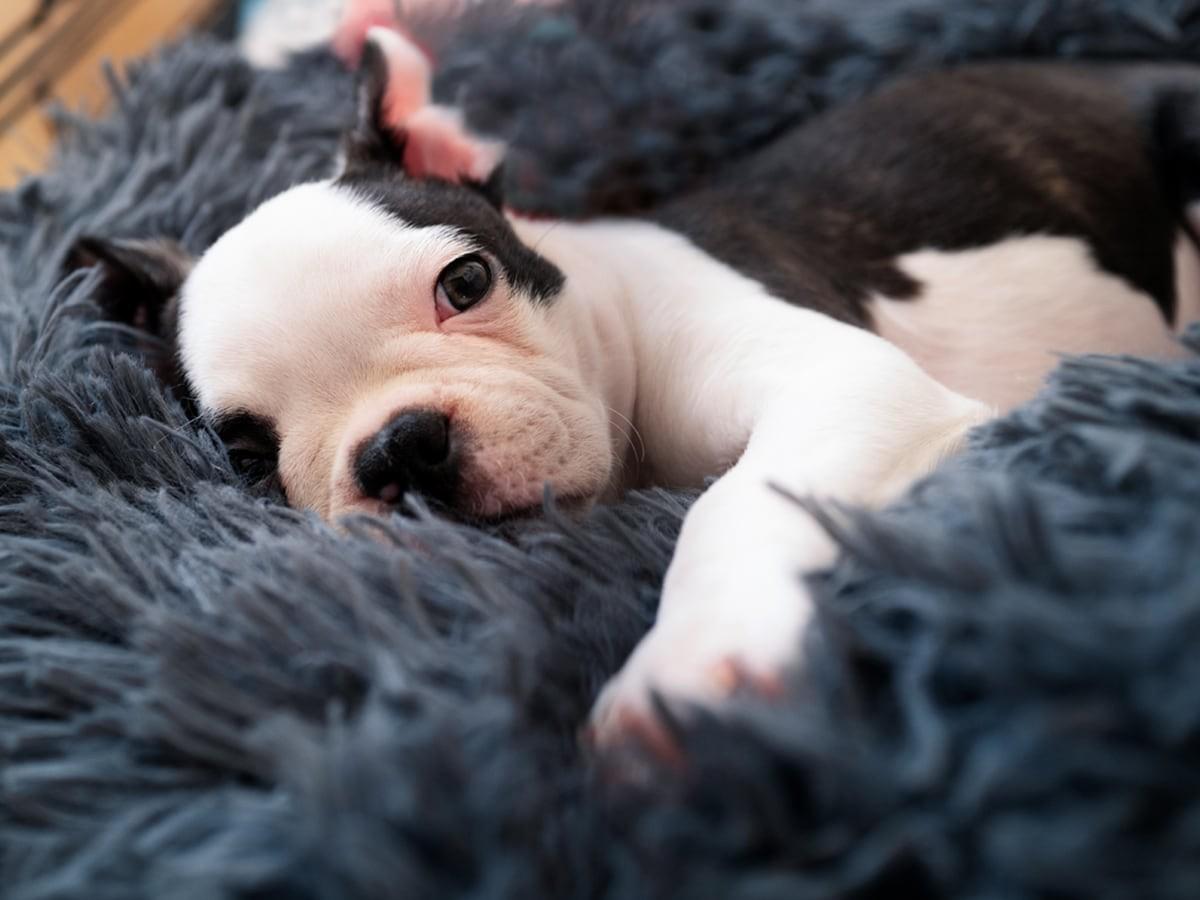Puppies are known for their bursts of energy followed by long naps, but many pet parents wonder: how much do puppies really sleep? Sleep plays a huge role in your puppy’s growth, learning, and overall health. Understanding what’s normal will help you feel confident about your pup’s routine.
How Much Sleep Do Puppies Need?
Most puppies need 18 to 20 hours of sleep each day, depending on their age1. Newborns sleep almost all the time, while older puppies spend more hours awake but still rest frequently. By the time your pup reaches adulthood, they’ll settle into about 12 to 14 hours of daily sleep3.
Puppy Sleep Schedule by Age
Sleep needs change as your puppy grows. Here is a breakdown of about how much puppies tend to sleep depending on their age3.
Puppy Age | Average Hours of Sleep Per Day | Notes on Sleep Patterns |
Newborn (0–8 weeks) | 21–22 hours | Sleep almost constantly, waking only to nurse or eat. |
8 weeks (2 months) | 15–20 hours | Frequent naps throughout the day; short bursts of play and activity. |
3 months | 15–20 hours | More awake time for training and play, but still lots of naps. |
4 months | 14–16 hours | Sleep starts consolidating, with longer stretches at night. |
6 months+ | 12-14 hours | Sleep patterns begin to resemble those of adult dogs. |
Why Do Puppies Sleep So Much?
Puppies sleep a lot because their bodies and brains are working hard to grow. Sleep helps with brain development, memory, and learning new skills3. It also gives their muscles, bones, and immune system time to recover2. Even short play sessions can tire out a puppy, which is why naps are so frequent.
Helping Your Puppy Sleep Better
A predictable routine makes it easier for puppies to settle. Try to feed, play, and take potty breaks at regular times. Give your puppy exercise during the day to burn energy, but keep evenings calm so they can wind down. A comfortable, quiet space, like a crate or designated bed, also helps them feel secure.
Sleeping Through the Night
Young puppies can’t hold their bladder through the night. At first, you may need to take them out every few hours. Over time, as their bladder grows, they’ll be able to sleep longer stretches. Staying consistent with bedtime routines will help your puppy adjust to overnight sleep more quickly.
Sample Daily Puppy Sleep Schedule
A typical day for a puppy might start with a morning potty break, breakfast, and playtime, followed by a nap. Midday includes more play, training, and another nap. In the afternoon, they’ll be active again, then rest. Evenings should include play, dinner, and a calm wind-down before bedtime. This kind of balance gives your puppy both stimulation and plenty of rest.
Is Your Puppy Sleeping Too Much?
It’s normal for puppies to sleep more during growth spurts or after busy days. Extra rest usually isn’t a problem as long as your pup wakes up for meals, play, and interactions. However, if your puppy seems overly tired, won’t wake easily, or skips meals, it’s best to check in with your vet to rule out health issues.
Frequently Asked Questions
How much sleep does a 3-month-old puppy need? At 3 months old, most puppies need about 15 to 18 hours of sleep each day3. This includes both nighttime rest and several naps throughout the day.
How much should an 8-week-old puppy sleep? An 8-week-old puppy typically sleeps 18 to 20 hours per day1. Their growing bodies and brains need plenty of rest between meals and playtime.
How long does a 4-month-old puppy sleep? By 4 months old, many puppies sleep around 14 to 16 hours a day3. They’ll still nap often, but nighttime sleep usually becomes more consistent.
Should I let my puppy nap as long as she wants? Yes, it’s best to let your puppy nap as needed. As long as she’s waking for food, play, and interaction, long naps are a healthy part of her development.
More About Spot Pet Insurance
Spot accident and illness plans can be used with any licensed vet in Canada or the U.S. Whether you are home or traveling to the U.S., Spot can reimburse the cost of vet bills for the diagnosis, treatment, or management of covered conditions. Spot’s accident and illness plans can help cover a variety of conditions, including broken bones, lacerations, aggression, kidney disease, diabetes, and more. Pet parents can also get cash back on the cost of routine care, including wellness exams, certain vaccinations, dental cleanings, and more, by adding a wellness rider to their plan for an additional cost.
To learn more about Spot Plans or to get a free quote, click here.
Key Takeaway
Puppies need a lot of sleep—often more than 18 hours a day1 because rest is essential for healthy growth and learning. Their sleep needs change as they age, but with a routine, safe sleep space, and patience, your puppy will develop good habits. Remember, plenty of sleep is normal, and supporting it helps your puppy grow into a happy, healthy companion.

The resident animal enthusiast at Spot. I have a lifetime of pet parent experience. If it has fur, feathers, or scales, I’ve probably shared my home with it. I aim to be a reliable source, blending experience with a dedication to the well-being of pets.
Reisen, Jan. “How to Make Sure Your Puppy Gets Enough Sleep.” American Kennel Club, American Kennel Club, 9 Nov. 2023, www.akc.org/expert-advice/health/how-much-do-puppies-sleep/.
Schaible, Laci . “How Much Sleep Do Puppies Need? | Chewy.” Chewy, 30 Apr. 2025, www.chewy.com/education/dog/health-and-wellness/how-much-should-puppies-sleep.
The Kennel Club. “Why Does My Puppy Sleep so Much | the Kennel Club.” Www.thekennelclub.org.uk, www.thekennelclub.org.uk/health-and-dog-care/health/health-and-care/a-z-of-health-and-care-issues/why-does-my-puppy-sleep-so-much/.












